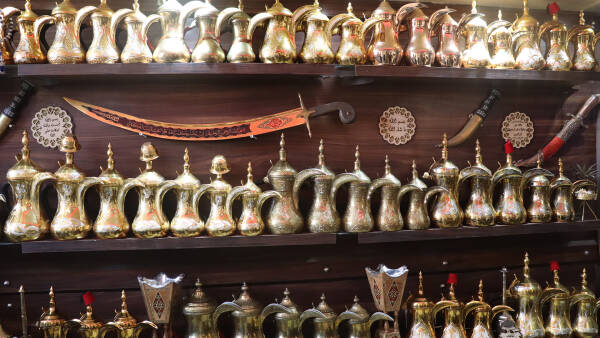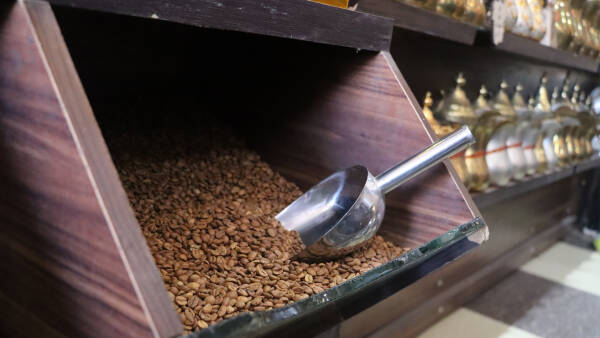Arabic Coffee and Its Rituals in Raqqa Canton
Through the opening of her traditionally and culturally inspired Arabic coffee shop, Iman Badr al-Din has successfully revived the rituals and heritage of coffee drinking.

Nour-ALAMAD
Raqqa-arabic coffe was inscribed in 2015 on UNESCO’s Representative List of the Intangible Cultural Heritage of Humanity. Known for its distinct bitter taste — as sugar is never added — it is a traditional beverage cherished across Arab societies in the Arabian Peninsula, Iraq, the Levant, and Egypt.
Despite a slight decline in its prevalence, the culture of Arabic coffee has not disappeared; it remains a profound cultural heritage symbolizing generosity and hospitality. Recognizing its importance, a young woman from Raqqa Canton, Iman Badr al-Din, decided to leave her mark on the history of Arabic coffee by opening her own shop in Raqqa, in the Autonomous Administration of North and East Syria — a region that has preserved the tradition of bitter Arabic coffee despite the many changes in customs and traditions.

Arabic coffee and Its traditionla Rituals
Iman Badr al-Din says that Arabic coffee is renowned not only for its unique rituals and customs but also for the way poets have celebrated its beauty and delightful taste. She notes that people in the region still preserve the tradition of drinking it, preferring it over other beverages.
She believes that preserving the region’s heritage and cultural traditions is primarily the responsibility of women — a belief she has embodied by opening her own Arabic coffee shop, designed in a traditional, old-style manner that distinguishes it from other shops in the area.
Iman explained that her deep passion and love for coffee inspired her to open the shop:
“I have a strong attachment to coffee and to drinking it. Since childhood, we grew up with its flavor and presence in our lives. We still prefer it over any other drink. I still remember, as children, our joyful gatherings beside our grandparents as they ground the coffee at home — the rhythmic sound of the grinder, and the fragrance of cardamom spreading through the neighborhood.

Coffee is not just a drink; it is an intangible heritage and a symbol of values for all Arab regions.
The design of her shop embodies the collective memory of the local community - a memory that takes anyone who sees or visits it back to the past, to the time of the ancestors when grinding coffee was a sacred ritual. This, she explains, was the main purpose behind her design:
“I came up with the idea of designing the shop in a traditional style that reflects the heritage and rituals of coffee in the past, because it brings me back to old memories and touches my soul. I deliberately added unique touches and heritage pieces, including beautifully crafted copper coffee pots adorned with intricate engravings — each pattern tells a story and bears the artisan’s signature. These pots were once used to preserve the authentic flavor of the coffee and add a rich, fragrant aroma.
Since opening her shop, Iman has noticed that the demand for coffee is higher than for other beverages:
“People in the region still prefer Arabic coffee and maintain its drinking rituals during gatherings of friendship and introductions. They even exchange it as a symbolic gift during personal visits.”
She explained that everyone has their own way of preparing and drinking it — with cardamom, plain, or sometimes with sugar:
“It’s considered the best drink for improving mood; it’s a source of energy and vitality, stimulating both the body and the mind. It also helps with hunger and headaches.”
Iman emphasized that coffee is not just a drink, but a symbolic and cultural heritage shared across all Arab regions:
“Coffee is served on all occasions — in joy and sorrow alike. It expresses affection, reconciliation, kinship, and connection. In Arab culture, refusing to drink coffee can even signify disagreement or the rejection of a request. The way it is served, the shaking of the cup, and the poetic verses recited about it all carry deep meanings. Many poets have sung of the beauty of coffee beans and those who drink them.
